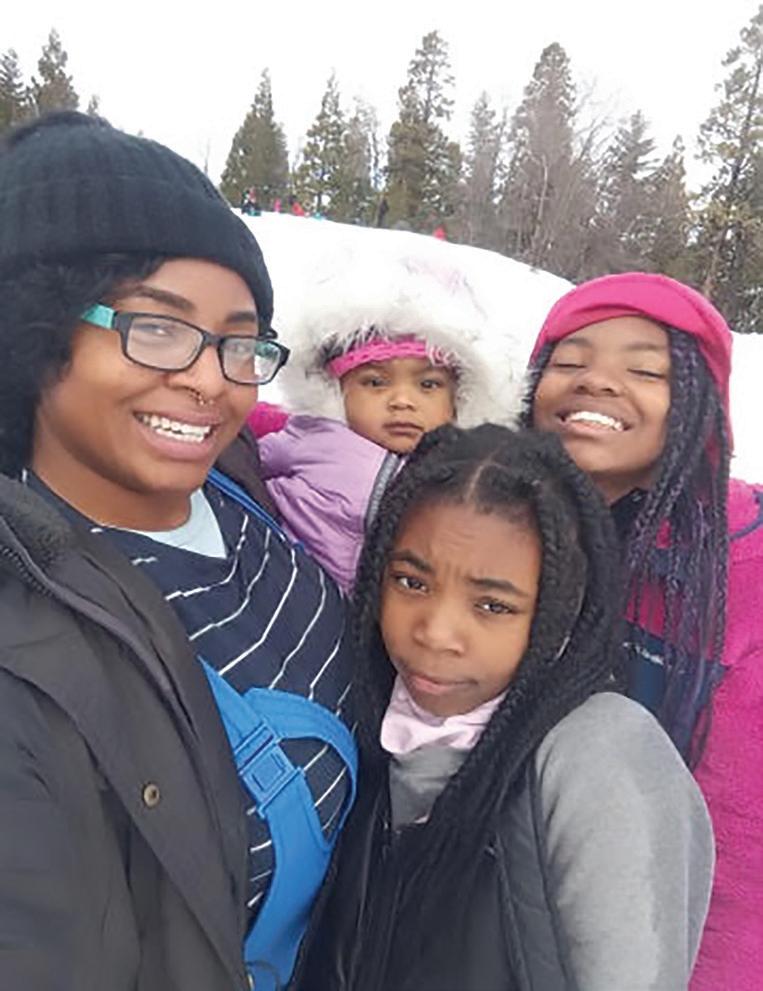
10 minute read
Calif. Atty Gen. Rob Bonta Takes Action to Protect Section 8
Renters
Lila Brown | California Black Media
Advertisement
It took authorities in Los Angeles 12 years to process and approve Delsean Keys’ Section 8 housing application.
After finally being accepted into the federal government’s Housing Choice Voucher (HCV) program for low-income households, the 41-year-old Keys was informed that he had only 90 days to find an apartment before his housing voucher would expire.
"Most landlords wanted to do a background and credit check along with income verification,” Keys, who lives in the Wilmington neighborhood of Los Angeles, told California Black Media (CBM).
After securing Section 8 housing at his current residence, where he’s lived for five years, Keys’ challenges did not end.
"During the COVID-19 pandemic, our landlord tried to raise rent, but we as tenants petitioned against it, pushing back that they couldn't do that,” Keys said. “We were facing a global pandemic at no fault of our own. Many of us were on unemployment and they even attempted to receive back rent.”
Keys eventually accepted a minimal rent increase due to a change in his income which is allowed as income must be reported to the local Housing Authority.
For many tenants like Keys, who receive rental assistance through the HCV program, the California Department of Justice (DOJ) reports that it is common for landlords to raise their rents in violation of the law, while adhering to established rent caps for renters who pay market rates.
On June 30, California
Attorney General Rob Bonta issued a letter to all housing authorities in the state, reminding

Attorney General Rob Bonta
them that tenants who receive Section 8 Housing Choice Vouchers are protected under California’s Tenant Protection Act (TPA).
According to the DOJ’s Housing Justice Team, there have been numerous complaints about some local housing authorities approving rent increases that exceed the TPA’s rent cap.
Landlords receiving approvals for rent increases may think they are in compliance with state and local law, but Bonta clarified in his letter that any rent increases outside of the guidelines of the TPA violate state or local laws and are “plainly wrong” and that the DOJ is taking those violations seriously.
Bonta emphasized that recipients of Section 8 vouchers are equally protected under laws that establish rent caps.
“As California grapples with an unprecedented housing crisis, it’s critical that we work together to protect those most at risk of losing their homes,” said Bonta. “Section 8 recipients are some of the most vulnerable of California’s tenants and subjecting them to illegal and burdensome rent increases is unfair and may contribute to homelessness.”
In the letters, Bonta explained that California’s TPA, which bars landlords from raising rent for most tenants by more than 5%, plus inflation, or 10% total each year, whichever is lower, applies to recipients of the Section 8 Housing Choice vouchers and other similar housing assistance programs.
“Unfortunately, there are some shady landlords who are not in compliance with how Section 8 operates,” says Joel Green, 38, a landlord who provides permanent and supportive
San Manuel Orange County Golf Tournament Raises $425,000 For Five Tribal, Local And National Nonprofits
24th Annual Tournament Recognizes O.C. based Meals on Wheels and Radiant Futures Among Others
HIGHLAND, Calif. (July
24, 2023) – The San Manuel Band of Mission Indians, Tribal leaders, business and community partners united for this year’s annual golf tournament to raise $425,000 for tribal, local and national nonprofits, making it the largest year for funds raised at the annual event. The San Manuel Band of Mission Indians has donated more than $3 million to 50 nonprofit organizations as a result of its annual golf tournament. The tournament was the first Tribal event at Waldorf Astoria Monarch Beach Resort & Club since the San Manuel Band of Mission Indians acquired an interest in the property earlier this year.
The annual event commenced on July 16 with a celebration and a check presentation of $85,000 each to five inspiring tribal, local and national nonprofits. Recipients included Lakota Waldorf School on the Pine Ridge Indian Reservation in southwestern South Dakota dedicated to providing an exemplary education to reservation students while incorporating their culture; housing for the elderly at Abode Communities. “Some private landlords discriminate, or they judge tenants based on their previous experiences, which is not fair. We need to shine light on what's actually going on with those landlords who are doing things that are not compliant with Section 8 rules.”
The federal government’s Section 8 HCV program – whose waiting list is currently closed for public registration due to a backlog of applicants -- is the country’s major program for assisting very low-income families, the elderly, and the disabled to afford safe and sanitary housing in the private market. Since housing assistance is provided on behalf of the family or individual, participants are allowed to find their own housing. The participant is free to choose any housing that meets the requirements of the program.
Housing choice vouchers are administered locally by public housing agencies (PHAs). The PHAs receive federal funds from the U.S. Department of Housing and Urban Development (HUD) to administer the voucher program.
Housing subsidies are paid to the landlord directly by the PHA on behalf of the participating family. The family then pays the difference between the actual rent charged by the landlord and the amount subsidized by the program.
Another landlord who spoke to CBM off the record said sometimes landlords do not intend to increase rents, but “problematic” tenants give them few options.
She said those tenants sometimes ill-treat or damage the properties they rent, which leads to “harsher-than-normal wear and tear, leading to host to exorbitant maintenance and repair costs.
As more cities across the United States struggle with the housing affordability and availability, the federal Housing Choice Voucher Program is in high demand. In densely populated cities such as Los Angeles, the waitlist can be abnormally long, authorities point out.
Recently, Mayor of Los Angeles, Karen Bass pleaded with local property managers and private landlords to take at least one to two vouchers during the city's State of Emergency against homelessness, which she declared in January. California’s housing affordability problem is a major contributing factor to the state’s homelessness crisis, which is having a disproportionate impact on Black Californians. About 30 % of the state’s approximately 160,000 homeless people are African American. Blacks make up less than 6 % of the state’s population.
Last week, Bonta provided legal guidance to local governments, warning them that the DOJ is willing to take legal action against cities that “frustrate” the state’s efforts to increase housing supply by enacting “emergency zoning ordinances.”
“Under California law, urgency zoning ordinances can only be enacted if a high bar is met. Unfortunately, we are seeing urgency zoning ordinances that fall short of meeting that high bar,” said Bonta. “Every community must do its part to build housing. I encourage local governments to take a good look at their urgency zoning ordinances for compliance.”
San Manuel Orange County Golf Tournament Raises $425,000 For Five Tribal, Local And National Nonprofits...continued
Padilla Urges OSHA to Implement Federal Heat Protections for Workers...continued face record-breaking and life-threatening extreme heat conditions, the health and safety of our workers must come first. We urgently need an enforceable federal heat standard that holds employers accountable and protects workers,” said Senator Padilla. “I urge the Administration to act quickly to protect our workers as temperatures across the country soar.”
The lawmakers urge Acting U.S. Department of Labor Secretary Julie Su and Assistant Secretary for Occupational Safety and Health Douglas L. Parker to establish an enforceable federal standard to ensure workers and employers can recognize and respond to the signs of heat stress.
The standard, modeled off of Padilla’s Asunción Valdivia Heat Illness and Fatalities Prevention Act, should require employers to provide the following: adequate hydration; rest breaks; areas for rest breaks that are shaded (in the case of outdoor work) or air-conditioned (in the case of indoor work); medical services and training to address signs and symptoms of heat-related illness; and a plan for acclimatization to high-heat work conditions.
The letter also urges OSHA to incorporate the best practices from states who have taken a proactive approach to protecting works from extreme heat, including California.
“This year is expected to be the hottest on record, demonstrated by the hottest days on record on Earth in the first week of July, following the hottest ever month of June. Heat waves are associated with increases in death rates, driven not only by deaths directly caused by extreme heat but also by increases in deaths from heart attacks, respiratory illnesses, and cerebrovascular diseases. Heat waves are also associated with increased hospital admissions for cardiovascular, kidney, and respiratory disorders. As you know, many workers whose jobs require prolonged exposure to extreme heat are not afforded paid time off or sick days. Thus, any health complications caused by heat exposure can lead to missed work, missed wages, and financial instability for families,” wrote the lawmakers.
The letter is signed by U.S. Sens. Sherrod Brown (OH), Catherine Cortez Masto (NV), Bernard Sanders (VT), Richard Blumenthal (CT), Cory A. Booker (NJ), Kirsten Gillibrand (NY), Mazie K. Hirono (HI), Ben Ray Luján (NM), Edward J. Markey (MA), Robert Menendez (NJ), Jeffrey A. Merkley (OR), Jack Reed (RI), Chris Van Hollen (MD), Elizabeth Warren (MA), Sheldon Whitehouse (RI), Ron Wyden (OR), and Representatives Greg Casar (TX35), Judy Chu (CA-28), Sylvia R. Garcia (TX-29), Raúl M. Grijalva (AZ-07), Robert C. “Bobby”
Why
from page 1
Voices for Children which serves children in Riverside and San Diego County who are in foster care by providing court appointed special advocates; Citrus Counseling Services located in Redlands which provides mental health services at low or no cost; Radiant Futures of Orange County provides crisis support, services for survivors, and education to prevent domestic violence and human trafficking; and Meals on Wheels OC which provides programming to nourish the wellness of senior citizens in Orange County.
San Manuel Band of Mission Indians Chairwoman, Lynn Valbuena, says she is moved by the community’s commitment to providing a hand up to nonprofits that are dedicated to making a difference regionally and throughout Indian Country.
“Each year I stand in awe of the thoughtfulness and generosity of our sponsors and partners to continue San Manuel’s mission of supporting organizations that are truly the boots on the ground for making our world a better place,” said San Manuel Chairwoman, Lynn Valbuena. “These five nonprofits are improving the lives of so many Native Americans, as well as local communities, and we are proud to help. The tournament is one of the many ways San Manuel demonstrates its value of giving back.”
This year, golfers teed off on ocean-view golf courses at Pelican Hill Golf Club in Newport Beach and Waldorf Astoria Monarch Beach Golf Links in Dana Point from Monday, July 17 to Thursday,
July 20.
Presenting sponsors of the tournament included Imagine This and PENTA Building Group. Yaamava’ Resort & Casino was also joined by its sports partners from the LA Dodgers, LAFC and the Anaheim Ducks.
Supporting nonprofit organizations is part of the Tribe’s commitment to their Giving Pillar also known as “San Manuel Cares.” For more information on San Manuel Care’s Program, please visit: www.sanmanuelcares.org
Padilla Urges OSHA to Implement Federal Heat Protections for Workers
WASHINGTON, D.C. — Today, amidst record-breaking temperatures across the country, U.S. Senator Alex Padilla (D-Calif.), along with Senators Sherrod Brown (D-Ohio), Catherine Cortez Masto (D-Nev.), Bernie Sanders (IVt.) and Representatives Greg Casar (TX-35), Judy Chu (CA28), Sylvia Garcia (TX-29), Raúl Grijalva (AZ-07), and Robert C. “Bobby” Scott (VA-03), led one-hundred and twelve members of Congress in calling on the Biden Administration to implement an Occupational
Safety and Health Administration (OSHA) workplace federal heat standard as quickly as possible. The letter urges OSHA to model the standard after the provisions in the Asunción Valdivia Heat Illness and Fatalities Prevention Act, legislation previously introduced by Padilla, Brown, and Cortez Masto to establish an enforceable federal standard to ensure workers and employers can recognize and respond to the signs of heat stress.
“As millions of Americans
The best solution for a public health issue like tobacco smoking is education, treatment, and counseling. The government knows this approach well, as it’s led to tremendous declines in smoking since the 1960s. According to Statista, from 1965 to 2019, the prevalence of cigarette smoking in the U.S. has decreased from about 42 percent to 14 percent. Resources like quit-smoking websites, hotlines, medications, and text message programs contributed to this decrease, as well as common tobacco control policies like warning labels, advertising bans, and smoke-free environments.
For Those Who Don’t Understand That Prohibitions are Police Matters
The federal government has not yet released its blueprint for enforcement of this proposed ban; however, under federal guidelines, tobaccorelated incidents fall under the jurisdiction of the ATF (Bureau of Alcohol, Tobacco, Firearms and Explosives), an agency that works both independently and in conjunction with local law enforcement agencies to combat tobacco-related offenses. For advocates and policymakers to tell the public that the health department will enforce the ban, they are ignoring one key fact: anything banned becomes illegal and, therefore, a police matter.
Ban advocates acknowledge that there will be an increase in the trafficking of unregulated cigarettes nationwide. This creates a roadmap for organized criminal enterprises to expand their operations within Black and brown communities where individuals will be seeking their tobacco product of choice due to the ban. History has shown that nothing is better for expanding organized crime than prohibition. In addition, this could force traditionally law-abiding citizens, particularly elderly individuals, who prefer menthol products to the streets to seek illegal, unregulated tobacco products, and in turn, increase their risk of being victims of street crime.
Police officers I have spoken with say this will become one more reason for officers to stop individuals in communities of color impacted by the ban, leading to more negative interactions and less community trust where it’s already sorely lacking. This means a proactive police approach to solving the trafficking concerns will target individual possessors of contraband and illegal cigarettes to get the larger organized criminals. This is a police tactic that will, unfortunately, target individuals whose only crime is their choice of cigarette.
As a Former Director of the New York State Police Employee Assistance Program (EAP), I travel the nation speaking to policymakers, citizens, and other distinguished law enforcement professionals to further clear up misconceptions about the unintended consequences of the menthol ban. Many smokers and non-smokers (like myself) are unaware of the ban, and many are perplexed by the rationale behind banning products that are not the most widely smoked but instead are preferred by Blacks and Hispanics.
In conclusion, please remember that information is power; we must understand the unintended consequences of the menthol ban. Health concerns are more effectively managed through education, treatment, and counseling, not by police.





